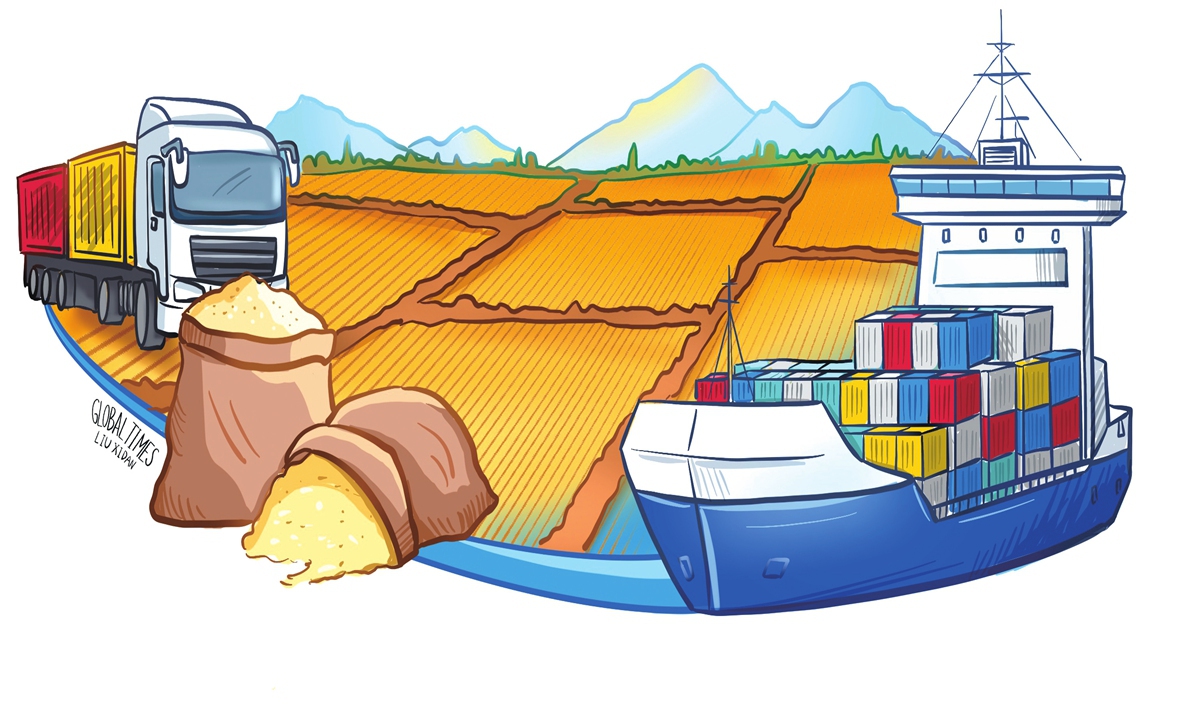
Illustration: Liu Xidan/GT
Western media outlets' attempt to interpret China's grain trade solely through the lens of economic slowdown overlooks China's prioritization of food security and its increasing flexibility in grain trade.The latest example is a recent report published by Bloomberg, which claimed that the world's farmers may face challenges due to a prolonged economic slowdown in China.
The report cites a decline in French barley exports to China and notes that the US has not yet been able to sell a full corn cargo for the new season.
Such narratives of economic slowdown causing a decline in China's grain import demand may more precisely reflect the Western lack of knowledge about China's efforts in terms of agricultural modernization and bolstering food security.
If anything, this narrow perspective not only oversimplifies the diverse factors influencing China's agricultural trade patterns, such as the country's ongoing efforts to enhance domestic grain production capacity and the strategic diversification of its grain imports, but also neglects the significant role China plays in maintaining the stability of international trade.
The Chinese government has consistently prioritized food-related issues, implementing policies designed to enhance agricultural production capacity. This effort includes significant investments in technological innovation, agricultural structural adjustments and the promotion of sustainable farming practices. Such efforts are integral to China's overarching food security strategy, which focuses on the enhancement of self-sufficiency as a vital component in ensuring a stable food supply for its population.
Since the 18th National Congress of the Communist Party of China, China has attached great importance to food security. It has been treated as a top state issue to ensure that the Chinese people have enough to eat.
China has made significant improvements in its agricultural infrastructure and ensured its farmland area remains above the redline of about 120 million hectares.
China's grain output hit a record high of 695.41 million tons in 2023, marking the ninth consecutive year for China to register a grain harvest of more than 650 million tons.
China's per capita grain volume reached 493 kilograms in 2023, higher than the internationally recognized security line of 400 kilograms.
The growth of China's grain production serves as a microcosm of its economic development, highlighting the optimization of the country's economic structure and the successes of its industrial upgrading.
Despite years of abundant grain harvests, China maintains a considerable scale of grain imports. In 2023, China imported 160 million tons of grain, a year-on-year increase of 11.7 percent.
China's grain imports not only reflect changes in domestic demand but also demonstrate China's flexibility in global trade. With economic development and the upgrading of consumption structures, China's demand for grain is becoming increasingly diversified, and the types and sources of imported grain are continuously expanding. This diversified import strategy reduces dependence on any specific country or region, thereby enhancing China's bargaining power in the international market.
China is actively pursuing closer trade relationships with various countries and regions to diversify its grain imports. This strategy helps stabilize domestic grain supply and also fosters cooperation and exchange among nations, contributing to the healthy and sustainable development of the global grain market.
By implementing a diversified import strategy, China can effectively safeguard its food security while also adopting a more proactive stance in international trade. This approach will enable the country to play a pivotal role in stabilizing the global grain market, fostering stronger trade relationships and mitigating risks associated with production fluctuations, ultimately benefiting both China and its trading partners.



